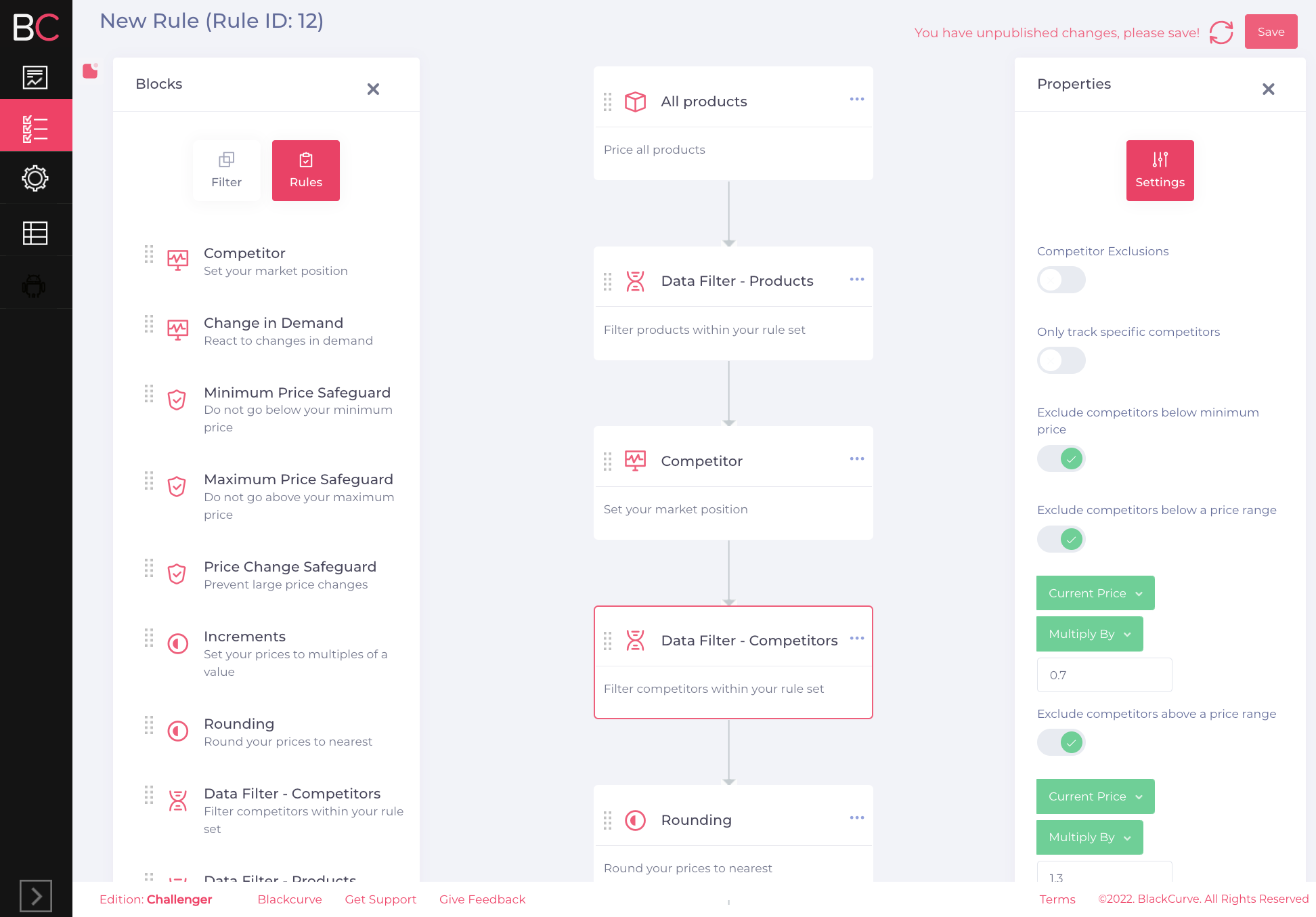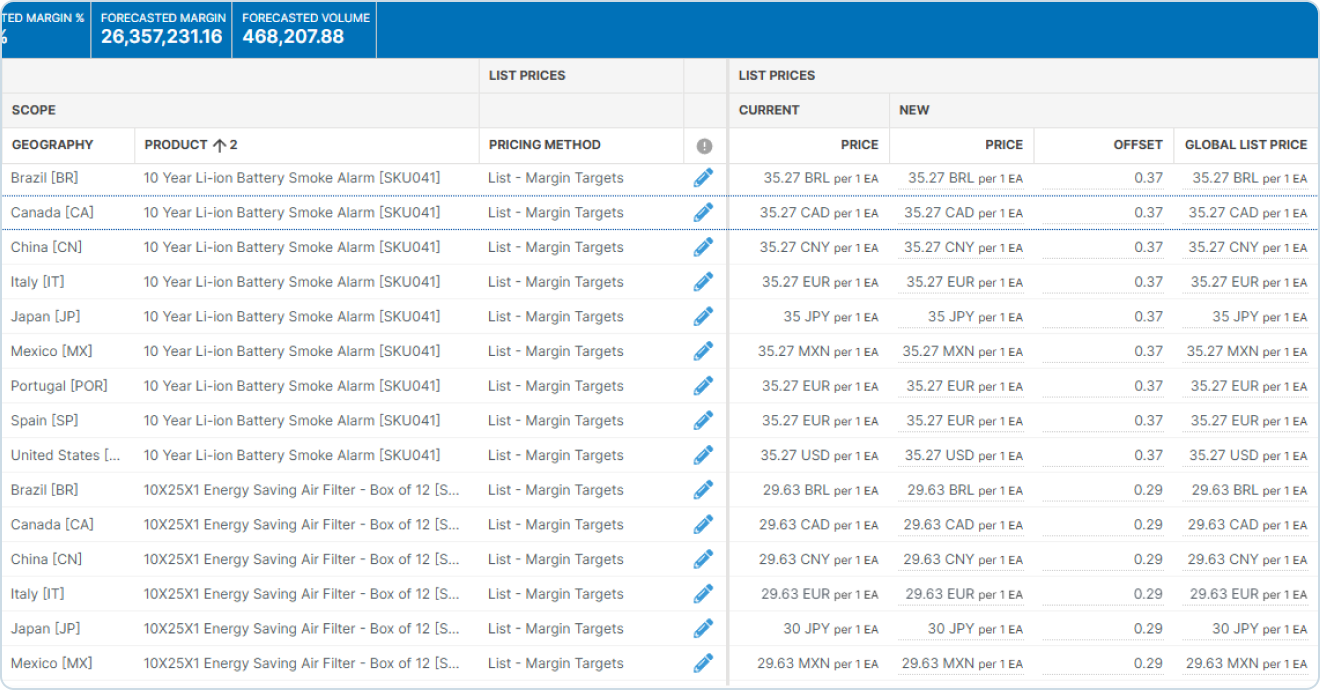Alternatives to Intelligence Node
1. BlackCurve
+Pros
- Pricing transparency and explainable AI
- Rapid implementation timelines of 4-8 weeks
- B2C/B2B hybrid architecture
- Real-time competitive response with sub-5-minute response times
- Native ecommerce integrations for Shopify and Magento
-Cons
- Performance degradation at very high SKU volumes (>500,000)
- Limited native ERP integration lacks SAP and Oracle connectors
- Interface reliability issues require occasional manual intervention
- Minimal B2B contracting capabilities
- Data dependency for optimal performance requires clean competitor URLs, accurate inventory levels, and comprehensive cost data feeds
One highlighted feature and why it's amazing
Processes multiple pricing variables including competitor data, inventory levels, and historical performance to execute autonomous price adjustments.

Another highlighted feature of why it’s amazing
Delivers response times under 5 minutes for price changes, enabling flash sale optimization and rapid market response.
2. Intelligems
+Pros
- Deep Shopify-native integration enabling functionality that generic testing tools cannot match within Shopify's ecosystem.
- Profit-centric analytics differentiate it from conversion-focused alternatives by emphasizing margin optimization over pure revenue growth.
- Rapid deployment capabilities with 1-6 week implementation timelines enable faster time-to-value compared to enterprise alternatives requiring months.
-Cons
- Platform dependency and testing complexity requirements.
- Subscription testing complexity involving duplicate products increases implementation challenges.
- Statistical significance interpretation requires analytical expertise or support guidance, potentially limiting accessibility for merchants lacking internal resources.
One highlighted feature and why it's amazing
Enables comprehensive experimentation across pricing, shipping, content, and promotional strategies through unified dashboard management.

Another highlighted feature of why it’s amazing
Provides deep platform connectivity through real-time API adjustments and DOM manipulation for seamless user experience.
3. PROS Pricing
+Pros
- The platform's ability to process over 400 million daily price calculations with 90%+ prediction accuracy.
- AI Transparency Leadership: Unlike 'black box' AI solutions, PROS Pricing provides visual dashboards displaying model performance metrics, prediction confidence levels, and decision logic.
- Enterprise Integration Excellence: Comprehensive ERP integration capabilities with major platforms like SAP S/4HANA enable seamless data flow between pricing optimization and core business systems.
-Cons
- The platform requires 12-16 week deployment timelines with 4-10 weeks for data migration.
- Implementation costs of $50K-$300K plus annual maintenance of 15-20% of license fees.
- Sales team adoption resistance occurs in B2B implementations where commission structures aren't realigned with new pricing workflows.
One highlighted feature and why it's amazing
The platform's neural networks process over 400 million daily price calculations with 90%+ prediction accuracy, enabling continuous price optimization based on market conditions, competitor actions, and demand patterns.

Another highlighted feature of why it’s amazing
PROS Pricing provides seamless integration with Shopify and Magento APIs for dynamic repricing, enabling synchronized pricing across multiple channels.
Other Alternatives
Pricefx
Pricestack
Vendavo
Wiser
Zilliant
How We Researched This Guide
About This Guide: This comprehensive analysis is based on extensive competitive intelligence and real-world implementation data from leading AI vendors. StayModern updates this guide quarterly to reflect market developments and vendor performance changes.
236+ verified sources per analysis including official documentation, customer reviews, analyst reports, and industry publications.
- • Vendor documentation & whitepapers
- • Customer testimonials & case studies
- • Third-party analyst assessments
- • Industry benchmarking reports
Standardized assessment framework across 8 key dimensions for objective comparison.
- • Technology capabilities & architecture
- • Market position & customer evidence
- • Implementation experience & support
- • Pricing value & competitive position
Research is refreshed every 90 days to capture market changes and new vendor capabilities.
- • New product releases & features
- • Market positioning changes
- • Customer feedback integration
- • Competitive landscape shifts
Every claim is source-linked with direct citations to original materials for verification.
- • Clickable citation links
- • Original source attribution
- • Date stamps for currency
- • Quality score validation
Analysis follows systematic research protocols with consistent evaluation frameworks.
- • Standardized assessment criteria
- • Multi-source verification process
- • Consistent evaluation methodology
- • Quality assurance protocols
Buyer-focused analysis with transparent methodology and factual accuracy commitment.
- • Objective comparative analysis
- • Transparent research methodology
- • Factual accuracy commitment
- • Continuous quality improvement
Quality Commitment: If you find any inaccuracies in our analysis on this page, please contact us at research@staymodern.ai. We're committed to maintaining the highest standards of research integrity and will investigate and correct any issues promptly.